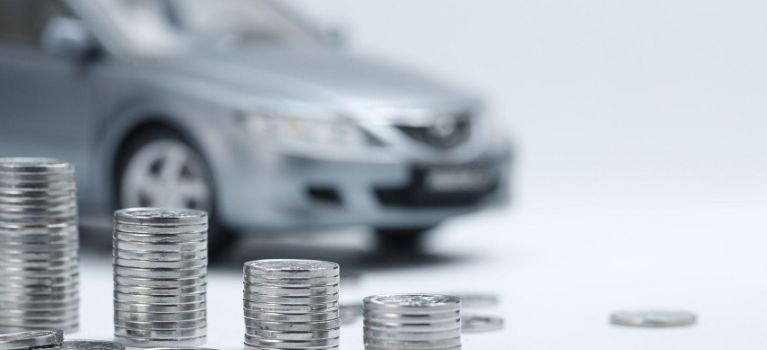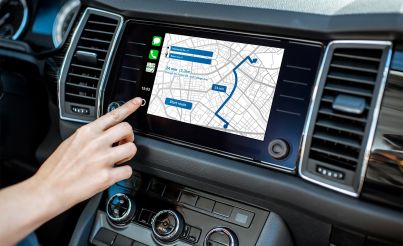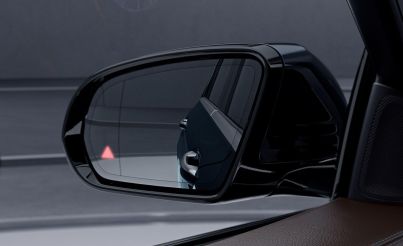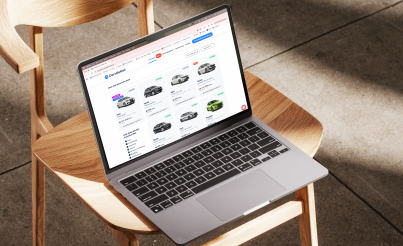- How high is the depreciation of your car?
- What factors influence the depreciation of your car?
- How to calculate the depreciation of your car!
- Loss of value after an accident - what you should bear in mind!
- Special feature: Why is the residual value of electric cars usually low?
- How can you minimise the depreciation of your car?
- The Carvolution car subscription: put an end to high depreciation!
It's obvious: everyday objects lose value over time. This also applies to cars, but the loss in value is significantly higher than initially assumed. In the first year alone, a new car loses a quarter of its list price.
The depreciation of cars also varies according to make and model, while electric cars in particular have a low residual value. In this article, you can find out what influences the residual value and how you can calculate and minimise the loss in value.
How high is the depreciation of your car?
If you have bought a second-hand or new car, you can be very sure that your model will depreciate in value, except in the case of classic cars and investment vehicles. Various studies show that a new car loses an average of 25% of its list price in the first year alone.
After three years, the vehicle is therefore only worth around half its list price. Even people who were aware of the rapid depreciation of the car probably have to swallow this figure.
The curve only flattens out after four years, although a loss of four to six per cent per year can still be expected. But what is the depreciation actually based on and what factors lead to the high depreciation?
What factors influence the depreciation of your car?
First of all, it is impossible to say exactly how much your car loses in value. What can be explained, however, are the factors that influence the value of your vehicle. Whether it's a used or new car, here is a list of the most important points:
Age (first registration): One of the most obvious factors is certainly the age of the vehicle. Every year, the value of your vehicle decreases, which is determined by the initial registration date.
Brand, model and vehicle class: The vehicle type also plays an important role. While small cars and vans in particular have proven to be stable in value in the past, luxury class vehicles are more likely to suffer a high loss in value. However, here too, the loss varies depending on the make and model.
Mileage: The more kilometers you cover with your car, the higher the loss in value - especially after the popular 50,000 and 100,000 kilometer marks. Reliable vehicles whose engines can withstand a high mileage will help you to reduce depreciation.
Vehicle equipment: Common and timeless paint finishes in black, silver or white are usually more stable in value than bright colours or extravagant foiling. High-quality optional extras and a configuration that is as ‘complete’ as possible also increase the value of the car over the years.
Condition: Every second-hand buyer is looking for a clean and well-maintained car and is willing to pay a little more for it. So if you are planning to sell your car on, make sure you take good care of it.
Market situation: The current market situation is also affecting the used car market. Is your model currently in high demand, are there problems with the supply chain or has your vehicle been affected by an emissions scandal? All of this influences the depreciation of the car.
How to calculate the depreciation of your car!
Unfortunately, there is no exact formula for calculating depreciation, so we have to disappoint you. However, you can use tools on the market to approximate the value of your car based on the model, year of first registration and mileage. Comparis and Autoscout offer corresponding calculators on their websites.
You can also look around the online car markets in Switzerland and search for your model. This will give you an idea of the market prices for different equipment and mileage.
Loss of value after an accident - what you should bear in mind!
If you take a look around online platforms, you will quickly realise that some vehicles are listed as ‘accident vehicles’. Even with a complete and proper repair, the loss in value is very high and the car is therefore difficult to sell.
If your vehicle is involved in an accident and you are not at fault, the person who caused the damage must of course be liable for the damage. In addition, you should definitely hire a qualified expert to calculate the loss in value of your model. If you only recover the workshop costs, you will have to dig deep into your own pockets due to the loss in value as an ‘accident car’.
Special feature: Why is the residual value of electric cars usually low?
Electric cars are also having a particularly hard time on the used car market. One reason for this is the rapid pace of technological progress. The ranges increase significantly from one model generation to the next. Secondly, the current high demand will probably be saturated in a few years. Nobody will have to wait months (or even years) for a new vehicle to roll off the production line. This will automatically bring prices down.
However, there is another component that has a negative impact on the residual value of electric cars: the loss of battery power. Tesla, for example, currently limits its battery and drive unit warranty to eight years (as of August 2024). As one of the most expensive components of the car, replacing it hardly makes sense from an economic point of view; too few models still have batteries that can be replaced by plug-and-play.
Although it can be assumed that this problem will be solved in the next few years thanks to the high level of innovation in the industry, it will still be several years before this becomes apparent on the used car market.
Incidentally, the situation is the opposite for diesel. Whereas in the past it was considered to be very stable in value, the situation is different today. The emissions scandal, diesel driving bans in cities and the boom in electric cars are having an impact on the depreciation of cars.
How can you minimise the depreciation of your car?
After considering the factors that lead to depreciation, the question quickly arises as to how you can influence the depreciation of your own car. Below we give you some tips and tricks to maximise the residual value of your car:
Model selection: Before buying a car, look around to see which models have held their value well in the past. In particular, models with a high demand - such as the VW Golf or Toyota Yaris - tend to have a high value stability. Also keep an eye on the future development of the car market.
Care and maintenance: Every used car buyer wants a well-maintained car in good condition. Therefore, make sure you have your car serviced regularly, keep the interior clean and minimise scratches and dents.
Mileage: Used cars often have a ‘sweet spot’ in terms of mileage, i.e. a number of kilometres at which a used car purchase is worthwhile. Therefore, make sure to adjust the timing of your sale accordingly.
The Carvolution car subscription: put an end to high depreciation!
Would you like to drive a vehicle that is as good as new, but don't want to suffer a 25% loss in value in the first year and 50% in the third? Then the car subscription is an ideal alternative for you.
With Carvolution, you always drive a new model from a large selection of vehicles. With the all-inclusive subscription, you benefit from fully comprehensive insurance, cantonal redemption, service and maintenance, taxes and tyres in addition to the vehicle. All included in one monthly total price.
Simply choose between a term of 3 and 48 months, then return the vehicle, change the model or end the subscription. In addition to the depreciation you save with the subscription, the price is also unbeatable. We not only promise this, we also guarantee it in the leasing comparison. Thanks to our best price guarantee, you will never pay more for the same model than when leasing. Find out more here.
Are you convinced by the car subscription, or are you still undecided? Then get in touch with our team for a no-obligation consultation and take a look around our wide range of models in the meantime.
Car with all-inclusive subscription
Insurance, registration, taxes, and more – everything included. Around 40 models from various brands.










